Cantata BWV 196, Der Herr denket an uns - Johann Sebastian Bach 'Helmuth Rilling'
Composition Year: 1707-08 in Mühlhausen
First Performance: 1707-08 in Mühlhausen or 1708?-06-05 in Mühlhausen
Dedication: Wedding (Possibly for Johann Lorenz Stauber's and Regina Wedemann's Wedding in Mühlhausen)
Recorded: Gedächtniskirche Stuttgart, Januar 1976
~
Performers:
Doris Soffel – Soprano • Aldo Baldin – Tenore • Niklaus Tüller – Basso
Albert Boesen – Violino • Jürgen Wolf – Violoncello • Manfred Gräser – Contrabbasso • Joachim Eichhorn – Organo • Martha Schuster – Cembalo
Bach-Collegium Stuttgart • Württembergisches Kammerorchester Heilbronn • Helmuth Rilling - Conductor
~
00:01 1. Sinfonia
01:50 2. Chorus: Der Herr denket an uns und segnet uns
04:21 3. Aria: Er segnet, die den Herrn fürchten
07:05 4. Duetto: Der Herr segne euch
09:14 5. Chorale: Ihr seid die Gesegneten des Herrn
~
Work:
Der Herr denket an uns (The Lord is mindful of us), BWV 196, is a cantata by Johann Sebastian Bach. The early church cantata, possibly for a wedding, is difficult to date, but is generally considered to be an early work on stylistic grounds. The text is a passage from Psalm 115, assuring of God's blessing, especially for children. Scholars have suggested the work may have been written for the wedding of Johann Lorenz Stauber, the minister in Dornheim who had married Bach and his first wife there in 1707, and Regina Wedemann, an aunt of Bach's wife, on 5 June 1708.
Bach structured the work in five movements – an instrumental Sinfonia, a chorus, an aria, a duet and a final chorus. He scored it for three vocal soloists, a four-part choir and a Baroque instrumental ensemble of strings and continuo.
History and words
The precise date of composition for this cantata is unknown, but it is generally considered to be an early work. The English Bach scholar Richard Jones notes that "although it survives only in a later manuscript copy", its stylistic features are evidence of an earlier date: its text comprises "selected psalm verses only, without any free madrigalian verse", it has no recitative, and the compositional approach "still breathes the air of the seventeenth century".
~
Many of Bach's later church cantatas were composed for the requirements of the liturgical calendar, but the early ones, including Der Herr denket an uns, were written for special occasions. The text is taken from Psalms 115:12-15, speaking of a thoughtful and blessing God. The passage includes in verse 14: "The Lord shall increase you more and more, you and your children". Many commentators, from his biographer Philipp Spitta onwards, have concluded that the cantata was written for a wedding. They have proposed weddings where it might have been performed, including Bach's own in October 1707, when he married his first wife Maria Barbara in Dornheim. The Bach scholar Alfred Dürr and others suggest that the cantata may have been written for the wedding of the minister Johann Lorenz Stauber, who had conducted the wedding ceremony for Bach, and Regina Wedemann, an aunt of Maria Barbara, in Dornheim on 5 June 1708. However, the wedding hypothesis is not proven, and the general text could fit other occasions.
~
The cantata was first published in 1864 in the Bach Gesellschaft first edition of the composer's complete works. It was published in the Neue Bach-Ausgabe in 1958, edited by Frederick Hudson.
~
Bach Cantatas website: https://www.bach-cantatas.com/
~
ATTRIBUTION
Music contained in this video is licensed to, Hänssler-Verlag, Germany
-
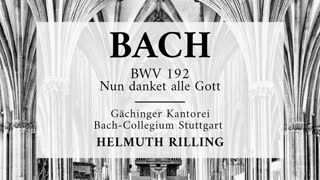 14:47
14:47
Classical Music P.D.
1 year agoCantata BWV 192, Nun danket alle Gott - Johann Sebastian Bach 'Helmuth Rilling'
61 -
 19:24
19:24
Classical Music P.D.
1 year agoCantata BWV 195, Dem Gerechten muß das Licht - Johann Sebastian Bach 'Helmuth Rilling'
38 -
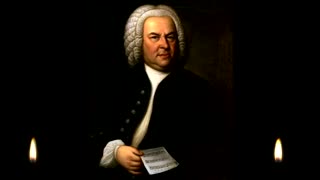 2:06:50
2:06:50
Born Again Prayer Warrior Agenda / BAPWA
8 months agoJohann Sebastian Bach - Classical Baroque Music - 8 Violin Concertos - ITS Philharmonic Orchestra
992 -
 7:42
7:42
Afrikitty
6 months agoMax Bruch, "SCOTTISH FANTASY" - Soloist Jasha Heifetz - Violin Concerto in E-Flat major, Op. 46.
8811 -
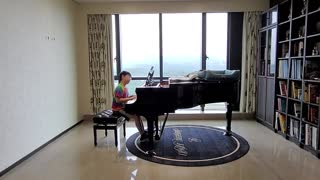 1:08:01
1:08:01
Cyrus Saladin Ming
1 year ago $0.01 earned(4 of 6) Self Goal Refresh 6 Beethoven Sonatas: Appassionata, Les Adieux, Moonlight, Pathetique
61 -
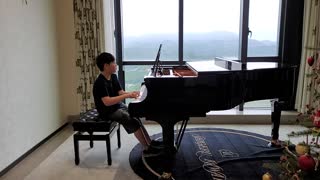 1:33:20
1:33:20
Cyrus Saladin Ming
1 year ago(5 of 6) Self Goal Refresh 6 Sonatas: Waldstein, Appassionata, Les Adieux, Moonlight, Pathetique
1032 -
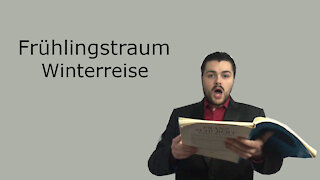 3:32
3:32
HolmesBaritone
3 years agoFrühlingstraum - Winterreise - Franz Schubert
45 -
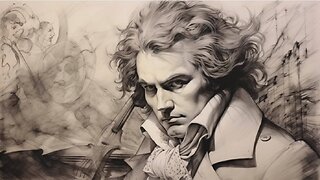 5:50
5:50
Afrikitty
5 months agoLudwig van Beethoven - Piano Sonata No 14 in C# Minor Op. 27, No. 2 - 1st Movement MOONLIGHT SONATA
1.94K24 -
![J.S. Bach: 6 Violin Sonatas [BWV 1014-1019]](https://hugh.cdn.rumble.cloud/s/s8/1/E/l/5/d/El5dq.0kob-small-J.S.-Bach-6-Violin-Sonatas-.jpg) 1:43:06
1:43:06
DoseOfChill
4 months agoJ.S. Bach: 6 Violin Sonatas [BWV 1014-1019]
253 -
 9:26
9:26
Relaxing Music Soul
4 months agoJohann Strauss | The Blue Danube Waltz | Johann Strauss's Enchanting Masterpiece
1995